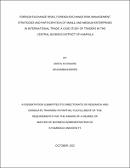Foreign exchange risks, foreign exchange risk management strategies and participation of small and medium enterprises in international trade. A case study of traders in the central business district of Kampala
Abstract
This study was an exploration of mediating effect of foreign risk management strategies on the
effect of foreign exchange risks on the level of participation of small and medium enterprises in
international trade. It sought to address four objectives; (i) to examine the common foreign
exchange risks faced by SMEs dealing in international trade, (ii) to examine the common
management practices used to mitigate Foreign Exchange Risks among SMEs dealing in
international trade, (iii) to explore strategies for managing foreign exchange risk amongst Small
and Medium Enterprises located in the business district of Kampala and (iv) to establish the
mediating effect of foreign risk management strategies on the relationship between foreign
exchange risks and the level of participation of SMEs in international trade. The study was
guided by Modern Portfolio Theory (MPT). The study adopted a cross–sectional survey research
design rooted towards a quantitative and qualitative approaches where data was gathered using
questionnaires and interviews from a sample of 384 respondents selected through simple random
sampling and stratified sampling techniques. The study used both quantitative and qualitative
data analysis techniques supported by SPSS (23.0). From the analysis the study established that
the major foreign exchange risks that affect SMEs dealing in international trade are contingency
risks, transactional risks, and translation risks of which these risks have significant negative
influence on the level of participation of SMEs. Furthermore, the study established that the
foreign risk management strategies used by SMEs are; minimizing any engagement in risky
ventures and engaging suppliers into future contracts. The study further established that risk
management strategies have a significant positive influence on the level of participation. Lastly,
it was established that foreign exchange risk management strategies have a significant mediating
effect on the relationship between foreign exchange risks and the level of participation. It was
therefore recommended that the owners and management of SMEs should develop and update
their risk maps so as to have a clear understanding of the potential risks that may have a likely
impact in their level of participation in international trade and to develop risk management
strategies and practices that may be helpful in dealing with the consequences of the potential
risks. For instance, they may consider avoiding high risky trading activities or consider less risky
mode of participation.

